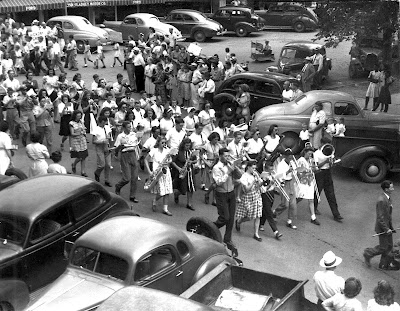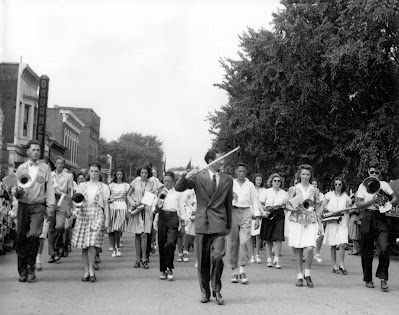December 2021
Charlie Armstead
Out of the blue, I received an email from Dave Hungate, someone whom I've never met and the son of one of the boys pictured below. His Dad, Bill Hungate, later became a U. S. Congressman and then a judge on the Missouri State Supreme Court. Dave sent me several photos including those shown below along with some newspaper clippings.
This is a picture of my Dad taken on July 4, 1941 in my home town of Bowling Green, Missouri. He's the guy on the far right with the baton. Charlie would have been 27 on that fine summer day. The depression continued its crippling grasp on the economy, most pronounced in the nation's heartland, but you wouldn't know it from the well-dressed people in this Norman Rockwell-esque setting. Pearl Harbor was still five months in the distance, although there would be few in this picture whose lives wouldn't be touched by that tragic day and the four years of war that followed.
Dad spoke often and fondly of his B.G. band students (from the years 1940-1953) and their subsequent achievements in life. In turn, they often celebrated their shared experience by hosting reunions and roasts of 'Prof' Wells. Judy, Lucy, and I were honored to attend one such event in 1976 when Lucy was just a wee baby. On these occasions I was told by most everyone, "Your Dad had very high expectations of his students, and we didn't want to disappoint him."
For some reason, these photos spoke to me, not just because they show my Dad as a young man, but because they reflect a largely now forgotten era. These are the youngsters that would become the 'Greatest Generation.' By my counting, there were at least 60 kids marching in that band. I'd guess more than half of the BG high school student body were then in the band given the population of Bowling Green in 1940 was only 1,975. Notice that even the little kids are marching behind the band in the first photo.
It is important to recall that America was still in the grips of the depression, yet somehow these kids had access to trombones, saxophones, clarinets, trumpets, French horns, flutes, and snare drums. It's too late to ask Dad, but I'd guess that most of these instruments were provided by the school. I recall visiting Dad's band room as a child in the late 40's and early 50's and being fascinated by all the instruments stored there. Bowling Green was certainly not a wealthy town, but it is clear that music was a high priority in their budgeting.
Schools were not integrated in BG in the 1940's, so the viewer will note the monochromatic tone of the students. However, if one looks closely, you'll note that quite a few of the spectators are African Americans.
Then there was Charlie. He looked so dapper in his double-breasted suit and tie. For the seven years preceding this photo, Dad led a swing band named The Charlie Armstead Band that played mostly at college venues in mid-Missouri along with summer time gigs in tourist settings in Minnesota, Michigan, and Indiana.
I've excerpted some articles from the Fayette, MO newspaper about Dad's band:
Fayette, MO
September 15, 1936
Armstead Band Back After Summer at Resorts
Charlie Armstead and his band have returned to Fayette en masse from a successful summer. Armstead, whose real name is Charles Armstead Wells, is a graduate of Central College and last year was assistant director of the Central bands. Many members of the organization are attending Central and the band will operate from Fayette during the school year.
This dance band was one of the most popular with Missouri dancers last year and has been very well liked in its three locations during the summer. The band opened at Waco Ballroom, Lake Wawasee, Indiana, one of the state's most popular resorts on June 13 for a two weeks' engagement. Armstead's band next opened at the Crystal Palace Ballroom on the shores of Lake Michigan. All attendance records were broken. The largest crowd the ballroom ever had coming on July 4 when 3200 people were on the dance floor at one time. Their final engagement began August 15 and ended Labor Day at the Melody Gardens in South Bend, Indiana. Buck Rogers and his orchestra played the gardens one night during the band's stay and Guy Lombardo had been there the Sunday before they opened. Armstead has contracted to play at the same places next summer.
Then came the last dance.
Fayette, MO
February 28, 1941
Charlie Armstead's Dance Band Changes Name After Seven Years
Charlie Armstead's band, a phrase which has meant dancing for seven years of Central College students, exists no longer under that name. The last dance played under Armstead's ownership was the UDC Ball Friday night, and it was announced there that John 'Ben' Dover had purchased maestro Armstead's interest.
The personnel and management of the band will remain the same with Bobby Smart, popular trombone player, directing and booking. The only change will be that Dover will front the band on jobs while Smart takes over the trombone chair. Dover, a trumpet man, will probably not play except on special choruses.
Everything that formerly had a part in the Armstead setup went into the hands of the new owner. Stands, lights, trailer, stock, and special arrangements, contracts, public address system, and eleven musicians.
Several innovations will be introduced, including comedy, specialty acts, and glee club singing. Next year a girl vocalist will be an added feature.
The dance band, which has a following all over central Missouri will continue to use the name 'Charlie Armstead's Orchestra' until the end of May, when all the advance bookings have been completed. Bookings from now on will be made under the new name, 'Ben Dover's Band.'
For the time being, the original theme, 'Time to Go', a distinguishing feature of the Armstead band, will be used. Later a new theme song will have to be selected. Dover said 'Time to Go' will still be played as part of the regular repertoire.
And that was that.
Charlie started his new position as band director of the Bowling Green Bobcats, and presumably could no longer juggle the two distinct careers. He was also newly married to my Mom, then 20. Helen graduated from Central College at the precocious age of 18. She started at age 15. Her Dad, Jesse Welsh the high school principal in West Plains, MO, was not terribly enamored by his oldest daughter's engagement to the 26-year-old, peripatetic, zoot suited musician. Jesse's plan was that Helen would use her newly acquired teacher's salary to help support the Welsh family of seven. It was not to be as Mom and Dad wed on December 22, 1940. Jesse warmed up to his son-in-law only after grandchild #1, William Wylie Wells joined the family in 1944.
Dad was not just the band director of the high school band. He was also the music teacher for the primary school. I remember being terribly proud when my Dad would come to our first-grade classroom, hand out sticks, and we could bang them together, presumably in some rhythmic fashion.
Dad loved everything about his teaching days in BG, and would maintain contact with his former students the remainder of his life. But he also had a practical side. In 1953, he took a position selling band instruments for McLean's Band Instruments in Kansas City, MO. Many years after the move, I asked Dad, why we moved, and he said, "I was earning $300 a month as a teacher, and I could see no way to pay for three kids to go to college on that income. Mac McLean offered me $10,000/year. I couldn't pass it up."
The new position gave Dad an opportunity to call on schools all over Missouri. He served as a judge in music contests for many years. I'm told he was a very tough judge. Charlie continued to play clarinet with some local groups, and he would occasionally jam with friends in our living room. He was later inducted into the Missouri Music Hall of Fame.
I'm certain of one thing. If you ever met my Dad, you'd like him. If you're still reading, thanks for joining me on this journey down memory lane.
Other Stuff
American Royal
In October I joined son-in-law Fred and twin 11-year-old grandsons, Finn and Charlie, to attend the American Royal Junior Livestock Show. It was quite a treat. In case you've never been, think Westminster Dog Show, but with cows, pigs, sheep, and goats. I've never seen such tricked-out, well-tended critters in my life. Young people, typically aged 9-17, stand by their animal and greet the spectators and potential bidders.
The kids with whom I visited were amazingly mature. One cow caught my fancy, as it was the color of Lassie with balls of fur trimmed around the ankles, or whatever you call ankles on a cow, and at the end of the tail. The skin/fur was luxuriously groomed, and the cow's name was Ricky. The 14-year-old owner from a small town in Iowa told me how she gets up at 5:30 every morning to feed and groom him, then repeats after school and before going to bed. The cow gains 5 lbs. a day. I noticed that all the cows were poop free, and I inquired how this can be. The young lady said she uses paper towels to clean up any mishaps. What a kid.
Then I talked to a nine-year-old pig owner from a small town near my hometown of Bowling Green. Her parents stood nearby and entered into the conversation. Turns out they are in the business of selling 'starter pigs' to 4-H kids interested in livestock shows. They have a farm with an inventory of 1,000 Hampton piglets. I asked how much such a pig costs. Answer, a 60-pounder goes for between $500 and $5,000. Wow! I said, "Do you Fed-Ex them?" "No, we do a lot of driving."
Next stop was another nine-year-old pig tender from Arkansas. From my meanderings I noticed that all the exhibitors had a sign with the name of the animal and the owner's name and hometown. Most of the names were Ricky, Bobby, Susie, et al. But this little girl's pig was named Collide. I inquired about the unique name, and the tiny tyke explained in her extreme southern accent. "Well, some nice lady called me and asked the name of my pig, and I said C'lyde, and that is how she spelled it."
We were all impressed by the work ethic and poise of the kids we met. Fred offered, "These are the kids I want to hire right now."
After viewing the various exhibits, it was time for the auction, but there was a problem. Charlie was having none of this. Charlie asked his Dad, "You mean these kids spend a year raising these animals, they name them, and spend hours of every day with them, and then they sell them to rich people to slaughter?" Dad, "Yes, that's about it." Charlie is periodically and nominally a vegetarian, if you don't count Chicken McNuggets or bacon, and he was horrified. So, we skipped the auction.
In case you're curious, the prize-winning cow went for $250,000.
Numbnuts
As I was driving back from the farm one day with Finn and Charlie, I encountered a fellow driver whose motoring skills left something to be desired. I calmly muttered to no one in particular, "What a numbnuts."
Charlie then inquired, "Did you learn that word from Waverly?"
"No," I replied, "It's the other way around."
"Well, she's using it now."
This knowledge filled me with joy, knowing that, even at my advanced age, I can still make a contribution to the grandchildren's verbal development.
Augie
Returning from the farm party, Ben asked Judy to get the Sunday night Chiefs' game on the radio. She didn't know where it was and fumbled a bit. Two-year-old Augie in the backseat said, "Alexa, play the Chiefs' game."
Stump Grinding
If you ever find yourself feeling a little low, you might consider renting a stump grinder for a few days and obliterate a few hundred of those annoying, equipment destroying projections. In my case I spent five days at the farm with a 31-hp Baretto S30 rented from a local vendor. It was an extremely gratifying experience. As I was cheerily returning the powerful machine, my mind wandered to one of my favorite tunes from the past written by Mason Williams, "Them Toad Suckers." The final stanza says it all:
How to be a toad sucker, no way to duck it,
Gittchyself a toad, and rare back and suck it
And I thought how easily the song could instead be a paean to stump grinding.
Fairway Magazine
Amazingly, I was featured in an article in Fairway Magazine, a local publication. The headline, "Mission Hills Writer Shares Stories About Not So Ordinary People."
Somehow, the editor obtained copies of both Nude Nuns and Other Peculiar People and of Ordinary People Who Aren't. And she excerpted elements from each book for the article. The editor had me review her choices and asked for info to include on how people might obtain copies. I mentioned Amazon and my blog, nudenuns.blogspot.com. Regarding the latter, she said, "That's too provocative, I'll pass on printing that."
I've encountered this problem on several other occasions, so I will soon be creating a newly named blog to replace the old. This will mean conceding the thousands of visitors to the blog from Yemen, Armenia, and Russia, who I can only presume are disappointed porn seekers. I'll keep you posted on the new name.
Sales continue to trickle in, but not yet in sufficient quantities for me to reinstate my yacht order. I get inquiries and commentary totally out of the blue that pleases me greatly, serving as a mild recompense.
Merry Christmas and Happy New Year. May the blessings of the holiday season be with you and yours.
Chuck Wells
Charles A. Wells, Jr.
Author of Nude Nuns and Other Peculiar People and Ordinary People Who Aren't
Available on Amazon
Follow my blog at http://nudenuns.blogspot.com/
Or contact me directly at:
mailto:charlesawellsjr@gmail.com




